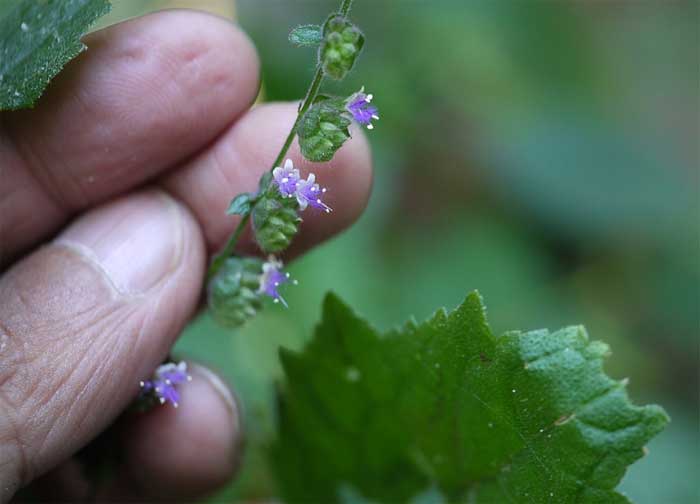Patchouli in herbal medicine and aromatherapy
The patchouli plant (Pogostemon cablin) is a member of the mint, lavender and dead-nettle family. It has been used for centuries for healing and as an aid to meditation.

Patchouli is used to repel moths from fine fabrics such as silk and cashmere. It first came to Europe and then America in crates containing cashmere shawls. Many Victorians loved the exotic scent and patchouli “perfume” became very popular.
Patchouli, science, and healing
Patchouli is traditionally used to treat gastrointestinal problems, colds, headaches, nausea, diarrhea, and poor appetite.
Studies show that gut microbes are very important to health and that plants containing polyphenols and polysaccharides are of great benefit. Patchouli, with high levels of these substances, improves gut health by suppressing the growth of "bad" bacteria, and stimulating the growth of "good" bacteria.
Patchouli essential oil is shown to have anti-inflammatory, antioxidant, anti-fugal, and anti-cancer properties. The oil can also suppress many harmful bacteria such as staph, salmonella, and E. coli.

Patchouli increases clarity and relieves depression.
Patchouli essential oil is considered grounding and balancing. It increases mental clarity and objectivity which makes it an excellent addition to meditation.
Patchouli is useful in aromatherapy when treating depression, frigidity, anxiety, and other stress related conditions.
It mixes well with many essential oils including sandalwood, frankincense, bergamot, cedarwood, myrrh, jasmine, rose, and citrus essential oils.
Love patchouli or hate it?
Patchouli essential oil is distilled from the dried branches and leaves of the patchouli plant. Patchouli has a strong earthy scent that is sensual and musky with a lingering spicy base note that improves with age.
Most people either love it or are repulsed by it, so use patchouli as a perfume with this in mind. Also look for quality patchouli essential oil. Aged patchouli can smell heavenly. A poor quality patchouli can smell like dirty feet.
Using patchouli essential oil in herbal medicine
Patchouli essential oil is an anti-depressant, a sedative, and a nerve tonic. It is used as an aphrodisiac, an insect repellant, and to sooth dry skin. Patchouli is used on bug bites, in love potions, and in face creams.

Use patchouli in small amounts.
Patchouli is often added to herbal baths where it calms the nerves and relieves anxiety.
It is also combined with almond oil and used as a skin moisturizer.
Patchouli is very calming when used in small amounts, and is very useful when treating insomnia.
When overused, it can cause over stimulation and loss of appetite.
Patchouli essential oil for weight loss
Patchouli is sometimes used as an aid to weight loss. It helps tighten up loose skin after weight loss, helps clear the body of cellulite, and is diuretic.
Patchouli is an antiseptic.
Patchouli essential oil is used on minor burns and irritated skin to help heal and protect.
In some countries, patchouli is used as a deodorant. It is a good antiperspirant.
Patchouli is also useful in the treatment of headaches, colds, abdominal pain, and diarrhea.
Patchouli balances hormones and helps heal the skin.
Patchouli helps balance the endocrine system and libido.
It can cool inflamed conditions and is useful when treating oily scalp, cracked skin, dandruff, psoriasis, tired feet, skin problems like eczema, acne, sores, scar tissue, and athlete's foot.
More about patchouli essential oil
Patchouli is used in aromatherapy to improve sexual desire. It can sharpen intelligence, improve concentration, and create a calming atmosphere.
Combining with jasmine, ylang-ylang, sandalwood, rose and vetiver brings extra strength that can inspire clarity, balance hormones, and improve thyroid function.
More than 140 compounds have been found in patchouli essential oil including flavonoids, alkaloids, glycosides, alcohols, and sesquiterpenes.
Patchouli essential oil has been shown to effectively control skin infections, odor, and pain in cases of skin ulcers, abrasions, and pressure sores. Healing times are significantly reduced.
Patchouli can also be used as an insecticide.
Other uses for patchouli
Patchouli is believed to have skin regenerative properties. It encourages replacement of skin cells.
Patchouli also helps with menopausal sweating and varicose veins.
Patchouli gained popularity in the 1960's when hippies discovered the scent. The "Make Love Not War" generation embraced the practice of burning patchouli incense. They also used patchouli in meditation and beauty products.

Patchouli's aroma is persistent and lingering.
Patchouli essential oil has a persistent, lingering smell and is often used as a fixative in perfumes and other herbal products.
Patchouli is native to Asia and grows wild in the Philippines, India, Indonesia, Malaysia, China, Vietnam, and West Africa.
It is a hardy perennial that requires a hot and humid climate.
Patchouli is cultivated in Malaysia as well as China, India, the West Indies, and South America. The leaves are often fermented to weaken the leaf cell walls to produce a better yield.
*Keep all essential oils away from the eyes. Do not take essential oils internally without consulting a qualified professional. Always dilute essential oils with good carrier oil and test on small area of skin before use.
Always consult with a healthcare professional before using any herbal remedy especially if pregnant, nursing, or taking other medicines.
Sources:
https://www.ncbi.nlm.nih.gov/pmc/articles/PMC6812344/
https://www.ncbi.nlm.nih.gov/pmc/articles/PMC6272783/
Blessings to you and yours!
Thanks so much for reading my blog. Jan.

*Note - the information on this website has not been evaluated by the Food and Drug Administration.
© 2005-2024 website design and content by Janice Boling